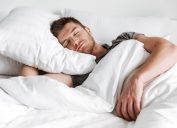5 Subtle Signs You Aren't Getting Enough Sleep, Doctors Say
Sleep deprivation can affect more than just how tired you feel.
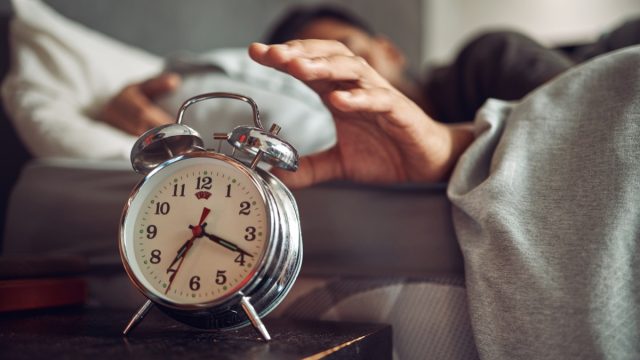
A good night's sleep is vital to our health, yet many of us are quick to cut into our slumber time for one reason or another. As David Seitz, MD, the medical director for Ascendant Detox, tells Best Life, most adults should be getting seven to nine hours of "consistent, uninterrupted sleep" each night.
Even if you're turning in early, you could be waking up in the middle of the night and losing precious hours without realizing it. So how can know whether or not you're actually getting the full amount of sleep you need?
We talked to doctors and gathered insight on the little things you may notice if you're falling behind on your required rest. Read on for five subtle signs that you aren't getting enough shut-eye.
READ THIS NEXT: I'm a Pharmacist, and This Is the Sleep Aid I Recommend.
1
You're more irritable than usual.

Finding it harder to keep your cool these days? If so, it may be linked to your nighttime schedule. "Not getting enough sleep can make a person more prone to irritation and mood swings," Seitz says. When we are tired, our body produces higher levels of cortisol—which is a hormone that is "linked to stress, anxiety, and depression," according to the medical expert.
"Additionally, a lack of sleep can reduce our ability to regulate our emotions in stressful or difficult situations," Seitz adds. "Therefore, if someone seems unusually irritable, it may be a sign that they are not getting enough sleep."
2
You keep getting sick.
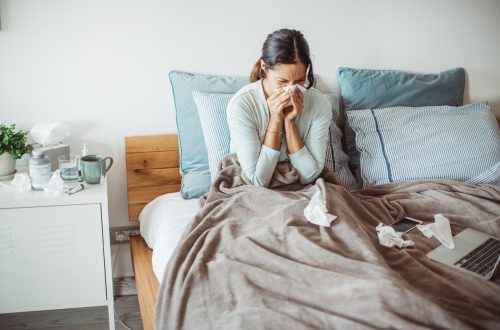
Sleep deprivation is directly linked to sickness. In fact, sleep loss over time can make us more prone to illness, according to Chelsie Rohrscheib, PhD, the head sleep expert and neuroscientist at Wesper. "Deep sleep is essential for restoring and maintaining many of our biological systems, including our immune system. For example, our immune system creates new antibodies and white blood cells that are responsible for fighting infections while we sleep," she explains. "When we're ill, our immune system ramps up its activity while we're sleeping, by activating cells that seek out and destroy infectious pathogens."
As Rohrscheib further explains, this is the reason we tend to feel sleepier when we're sick. "If you are frequently ill with infections, such as colds, tonsillitis, or rhinitis, to name a few, you may want to investigate whether poor sleep quality is to blame," she advises.
3
Your appetite changes.
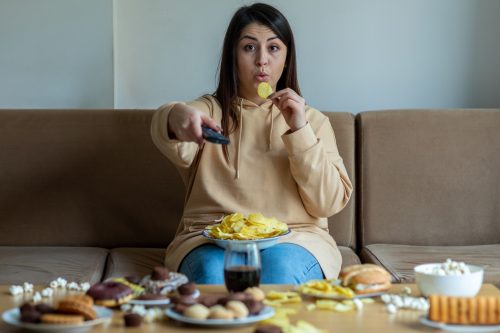
Your eating habits might also fluctuate when you're not getting a good seven to nine hours each night, according to Seitz. "A lack of sleep can affect our body's hormones responsible for regulating appetite," he explains. As a result, you might notice that your hunger levels have either increased or decreased—and you will likely have a newfound craving for unhealthier foods like sweets and processed carbohydrates.
"If someone is consistently overeating or under-eating without any other obvious causes, it could be a sign of sleep deprivation," Seitz says.
For more health advice delivered straight to your inbox, sign up for our daily newsletter.
4
You have headaches in the morning.
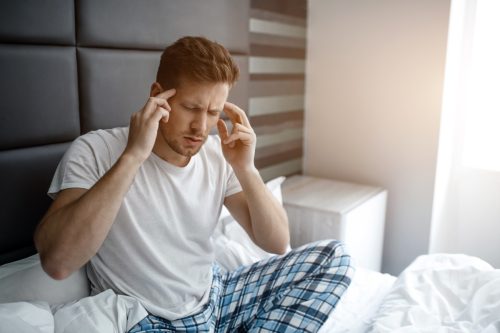
Waking up with a pounding head may be unavoidable from time to time, but it shouldn't be a regular part of your daily routine. According to Nancy Mitchell, RN, a registered nurse and contributing writer at Assisted Living, you may get morning headaches more often if you're not getting enough rest during the night.
"When you miss sleep, you also deprive your nervous system of a chance to regulate itself," Mitchell explains. "As a result, you may notice that your pain tolerance decreases, and you experience more frequent headaches."
5
Your skin doesn't look its best.
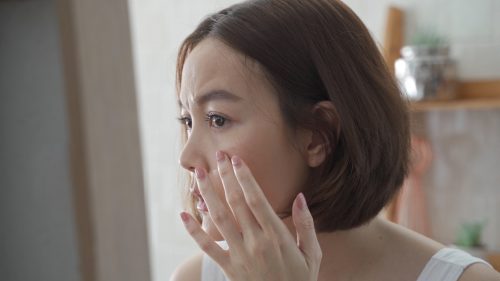
You might also notice physical changes to your skin if you're not getting enough sleep. According to Kemunto Mokaya, MD, a board-certified dermatologist working at Complete Dermatology in Houston, this could include dark circles under the eyes, puffy or swollen eyes, paleness, fine lines and wrinkles, acne breakouts, and dryness.
"Lack of sleep can cause blood vessels under the thin skin around the eyes to dilate due to poor circulation and fluid retention in the eye area, leading to the appearance of dark circles," Mokaya explains, adding that this fluid retention can also cause your eyes to become puffy or swollen.
Sleep deprivation can also reduce blood flow to the skin, which may make it look paler, and may also impair the skin's ability to retain moisture, resulting in skin that is flaky and easily irritated. "It can also disrupt hormonal balance, leading to an increase in sebum production and inflammation, which can contribute to acne and breakouts," she adds. "Chronic sleep deprivation may accelerate the aging process and lead to the formation of fine lines and wrinkles."
Best Life offers the most up-to-date information from top experts, new research, and health agencies, but our content is not meant to be a substitute for professional guidance. When it comes to the medication you're taking or any other health questions you have, always consult your healthcare provider directly.

